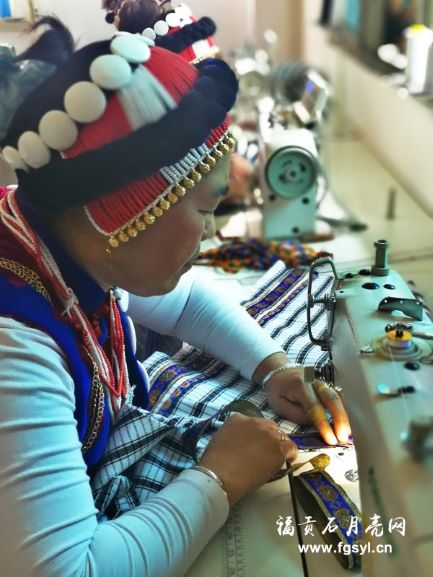Ethnic costume processing cooperative brings prosperity to village of Lisu ethnic minority group
By Li Maoying, People’s Daily
An employee of Qunfa ethnic costume processing cooperative make costumes in Chihengdi village, Lumadeng township, Fugong county, Southwest China’s Yunnan Province. Photo/Courtesy of the government of Lumadeng township.
Ci Luheng, who comes from the Lisu ethnic minority group in Fugong county of Nujiang Lisu autonomous prefecture in Southwest China’s Yunnan Province, has led villagers on a successful path of poverty alleviation by starting an ethnic costume processing cooperative at the Aludi poverty alleviation relocation site in Lumadeng township of the county.
Ci has gained much recognition from the villagers for his perseverance and hard work. Though he became physically challenged due to illness when he was a child and has to walk with a walking stick, he has managed to help the local people shake off poverty.
Ci was born in a village on the mountains along the precipitous Nujiang River Grand Canyon with spectacular scenery.
He dropped out of middle school due to poverty. At first, he could only do some simple handwork at home. However, the smart man never gave up finding ways to earn money and become better off.
Ci made his first pot of gold through construction contracting. Just two years later, he left the construction industry through which he could make a fast buck, saying that he wanted to help the villagers get rich.
Ci had always thought about how to enable the villagers to acquire skills and develop industries. As Chihengdi is a village of the Lisu ethnic minority group, where every family master the skills of spinning, weaving and cloth processing, Ci decided to encourage the villagers to produce linen products, which could be sold at a good price.
Ci and his wife began to purchase equipment, such as sewing machines, and design ethnic costumes. Whenever a new type of costume was launched, the products would soon be in short supply as they were much sought after.
In 2013, the man mobilized the villagers and established the Qunfa cooperative. The villagers raised more than 1 million yuan ($142,470) to purchase processing and manufacturing equipment and set up a special production team. This way, they overcame the shortcomings of home-based workshops, including rough fabrics, short production line, and non-uniform costume specifications.
The cooperative mainly produces costumes of the Lisu and Nu ethnic minority groups. Ci also led the villagers to enrich the variety of costumes and design new styles to cater for the demand of the customers.
Thanks to their joint efforts, the cooperative earned an average income of 20,000 yuan for each household that year.
The expansion of the production enhanced the brand effect of the cooperative’s products. To boost the scale and strength of the ethnic costume industry, the cooperative applied for a trademark.
With an annual production capacity of 40,000 suits of costumes, the cooperative is now selling its products to Myanmar, Singapore, Thailand, Japan and other places apart from Nujiang Lisu autonomous prefecture, generating an annual turnover of 3.7 million yuan. It has brought prosperity to more than 40 households.
“The business not only increases our income, but also inherits the traditional costume culture of ethnic minority groups,” Ci said, adding that the villagers are confident about the work because of this.
He is even busier these days, offering sewing training for villagers of the Lisu and Nu ethnic minority groups in Fugong.
Among the trainees are young girls in their early 20s and women of the Lisu ethnic minority group in their 50s. “I must pass the skill to them,” Ci said.
These trainees will finish their apprenticeship in two months, and work at the cooperative and other poverty alleviation workshops in the prefecture.
Besides, Ci is also busy running an online sales platform for his ethnic costumes. “Only by looking and thinking farther can we develop better,” he noted.













